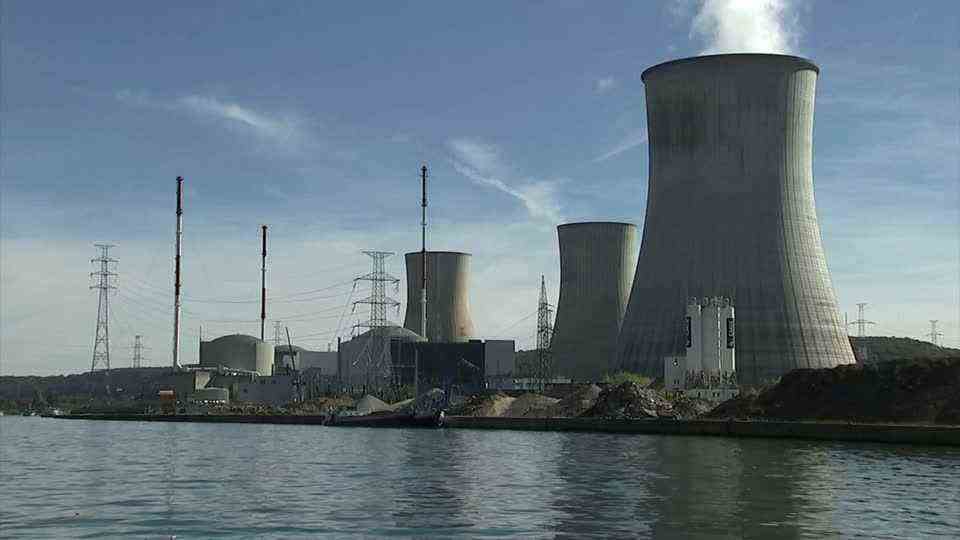Climate policy
EU wants to classify nuclear power and gas as green technology – and thus causes trouble in the traffic lights
The nuclear power plant in Gundremmingen in Swabia went offline on New Year’s Eve as part of the phase out of nuclear power
© Stefan Puchner / DPA
At the beginning of the year, the EU Commission proposed classifying nuclear power and gas as climate-friendly. The plans pose major challenges for the new federal government. What exactly is it about.
With its plan to indirectly support modern nuclear and gas power plants, the EU Commission is causing a stir on the first day of the new year. While Austria threatens to take legal action against the plans, countries like France or Finland see nuclear power as a key technology for a CO2-free economy. Germany is resisting the inclusion of nuclear power in the taxonomy, but considers a green label for gas as a transition technology to be necessary.
The controversial proposal of the EU Commission is putting the new federal government to the test. “We will now quickly examine the EU proposal and coordinate our efforts in the federal government,” said Environment Minister Steffi Lemke of the “Rheinische Post”. The Green politician had already sharply criticized the nuclear power plans as did Economic and Climate Protection Minister Robert Habeck (Greens) at the weekend. “The EU Commission creates the great danger of blocking and damaging really future-oriented, sustainable investments in favor of dangerous nuclear power,” said Lemke of the “Rheinische Post”. “I also consider the uptake of natural gas to be questionable.” Finance minister and FDP leader Christian Lindner, on the other hand, was generally positive about the proposal for modern gas-fired power plants.
EU plans for nuclear power: dispute between the Greens and the FDP
The classification of economic activities by the EU Commission within the framework of the so-called taxonomy is intended to enable investors to switch their investments to more sustainable technologies and companies and thus make a significant contribution to Europe’s climate neutrality by 2050. It is expected that it will have far-reaching effects, as projects classified as sustainable are likely to be much easier and cheaper to finance.
Specifically, the plans of the EU Commission provide that planned investments in new batteries in countries such as France, Poland and the Netherlands can be classified as sustainable if the systems comply with the latest technology standards and a specific plan for a disposal facility for high-level radioactive waste will be submitted by 2050 at the latest. In addition, it should be a condition that the new facilities receive a building permit by 2045.
Investments in new gas-fired power plants should also be able to be classified as sustainable, especially at Germany’s request. For example, it would be relevant how many greenhouse gases are emitted and whether the systems can also be operated with green hydrogen or low-carbon gas by 2035 at the latest.
There has been a dispute about how to deal with nuclear and gas power for months. For example, Germany has spoken out against including nuclear power in the taxonomy, but at the same time fought for a green label for gas as a necessary transition technology. For countries like France, on the other hand, nuclear power is a key technology for a carbon-free economy. It could have done without the inclusion of gas.
The deputy leader of the FDP parliamentary group, Lukas Köhler, made it clear that, from his point of view, blocking the EU proposal is not an option. “From our point of view there will not be a qualified majority against the Commission’s proposal on nuclear power, so it is right to continue working on this proposal,” he told the “Welt”.
The FDP party vice-president Wolfgang Kubicki told the “Bild”: “At least we have to find a consensus within the traffic lights on how we can balance the goals of CO2 reduction and stable energy supply. With a view to the criticism of Habeck and Lemke, he said, according to the report: “Incidentally, you are not a good European if you only accept decisions that suit you.”
These women and men rule Germany
17 images
Lindner: Gas-fired power plants as a transition technology
In addition to Habeck and Lemke, the SPD parliamentary group vice-president Matthias Miersch had sharply criticized the commission’s plans for nuclear power plants. When asked whether Germany should join a possible lawsuit by Austria, Miersch said that they were relying on discussions and negotiations.
“We do not see any approval of the new proposals of the EU Commission,” said Habeck. He also criticized the proposed inclusion of fossil gas in the taxonomy, but also said: “At least the EU Commission makes it very clear here that gas from fossil fuels is only a transition and that it must be replaced by green hydrogen.”
Finance Minister Lindner told the “Süddeutsche Zeitung”: “Realistically, Germany needs modern gas-fired power plants as a transition technology because we do without coal and nuclear power.” From the perspective of climate neutrality, the systems should later be able to be used with hydrogen. That is why the federal government has campaigned for the relevant investments to be effectively possible. “I am grateful that arguments were apparently taken up by the commission,” said the FDP leader. “From our point of view, further improvements are conceivable.” It is well known that the Federal Government takes a different view than the Commission on the issue of nuclear energy.
CSU regional group leader Alexander Dobrindt warned that a European energy mix must be able to differentiate itself from energy generation in Germany. “The traffic light parties have to learn that now,” he told the “Welt”. “Out of nuclear energy, out of coal, out of gas, that certainly can’t work for all EU countries at the same time and, by the way, not for Germany as an energy-intensive country that also needs electricity imports.”


